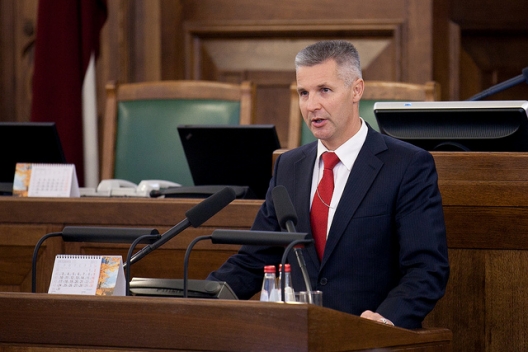 Since the end of the Russian-Georgian war in 2008, Russia has been seriously increasing its military budget (up 15-20% annually) and conducting military exercises with more than 100,000 personnel (Zapad 2009, Zapad 2013), targeted towards its western neighbours. Furthermore, Russia has increased its military presence near the Baltic and Polish borders and built up necessary infrastructure. . . .
Since the end of the Russian-Georgian war in 2008, Russia has been seriously increasing its military budget (up 15-20% annually) and conducting military exercises with more than 100,000 personnel (Zapad 2009, Zapad 2013), targeted towards its western neighbours. Furthermore, Russia has increased its military presence near the Baltic and Polish borders and built up necessary infrastructure. . . .
Russian policies continue to divide Europe, but it is time to change this:
Appeasement policies do not work with aggressors. We already learned it before World War II in Munich, and recently also in Syria. If one draws a red line and it is crossed, one should act. If a hypothetical aggressor gets the idea that NATO members are hesitant to act when some of its members are challenged, aggression will take place.
During the last ten years, a number of European politicians promoted economic interdependence between Russia and Europe as a tool to advance democracy and rule of law in Russia, as well as to gain economic benefits. It resulted in European political dependence on Russia. Economic interdependence makes Europeans incapable of imposing serious sanctions, while Russia as an authoritarian country retains its autonomy of decision making, and it will act if it decides so. . . .
Unfortunately as you can see, the latest polls in Germany show that 60% of Germans are not ready to boost the modest defence capabilities of Baltic region. The results of these polls are a reflection of the long-standing political hesitation of the Western political elite to attach an equal importance to the freedom and security of all countries. In light of the afore-mentioned poll, what would happen if the German public faced the need to go to war for the Baltics as Article 5 of the NATO Treaty requires? The Russian leadership is well-aware of the hesitation and, contrary to many Europeans, is ready not only to talk but also to act. If the crisis continues to escalate, and the lack of determination within major NATO states continues to persist, Russia’s leadership will use this weakness. Hesitation of the NATO member countries will encourage Russia to test the principles of NATO.
Dr. Artis Pabriks is a member of Latvia’s parliament, and has served as Latvian foreign minister (2004-2007) and defense minister (2010-2014).
Image: MP Artis Pabriks, October 17, 2011 (photo: Latvian Parliament)
